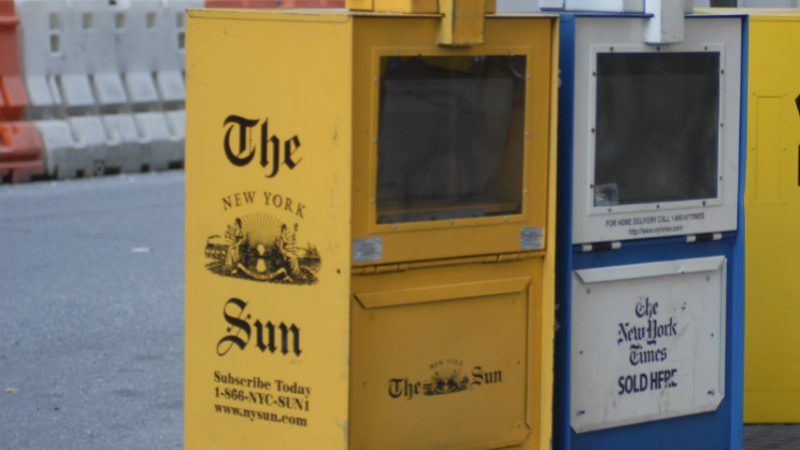How The New York Sun, Gone Since 2008, Explains Politics in 2018
In many ways, the Sun's decade-old coverage bears on issues and personalities in contemporary headlines.

For the world, this month marks the ten-year anniversary of the financial crisis. For me, though, the more personally significant anniversary is a related event—the end of print publication of The New York Sun, a daily newspaper of which I was a founder and managing editor and whose final issue was September 30, 2008.
About 50 of the Sun's staffers will gather this weekend in Manhattan for an informal private reunion. NYSun.com, the website now operated by the paper's editor, Seth Lipsky, has plans to mark the occasion with a podcast.
Old newspapers are said to be good for wrapping fish or perhaps informing historians. As I've dipped into the Sun's archives online as the anniversary approaches, though, I've been struck by how useful and relevant the Sun is as a guide to the present moment.
Watching President Trump's presidency shadowed by the investigation of special counsel Robert Mueller, I think of the 2004 Sun editorial "The Boldness of the President." It recounted how a special prosecutor's investigation of President Clinton had, fulfilling Justice Scalia's warning, sapped the president's boldness in the face of a gathering threat by Al Qaeda.
Reading about Trump's strained relations with his attorney general, Jeff Sessions, I look back at the Sun's coverage of an invitation that then-Senator Sessions issued Trump to testify before Congress about excessively costly plans to renovate the United Nations headquarters. As far as I can tell it is where the two men first publicly crossed paths.
On Trump in general, I look back on a piece I wrote for the Sun in 2004, observing, "There's a contempt for Mr. Trump among certain of New York's elites."
When Trump pardoned I. Lewis "Scooter" Libby, I thought of the Sun editorial that had recommended such a pardon.
When Trump fired the FBI director James Comey and Comey then emerged as a public critic of Trump, I thought of the Sun editorial "Comey's Overreach." It was about the federal case Comey had brought against Martha Stewart.
When Trump moved the American embassy in Israel to Jerusalem, he was following the course advised by a 2004 New York Sun editorial, "Jerusalem, Israel."
Press reports from the Middle East indicate that Trump's Middle East peace negotiators recently asked the chairman of the Palestine Liberation Organization, Mahmoud Abbas, about the possibility of a confederation between the West Bank and Jordan. If Trump pursues that idea, he'll be following a plan proposed by a 2007 Sun editorial, "Three-State Solution."
The poor performance of the New York subways has been the subject of mounting frustration by New Yorkers and extensive recent press attention. That was an issue for the New York Sun starting with its first editorial, in 2002, which recounted my questioning then-Mayor Bloomberg about the possibility of privatizing the train lines. Bloomberg reacted skeptically, and 16 years on, the government-operated subways are plagued by delays and breakdowns.
Bloomberg's presidential ambitions in the 2008 election year were encouraged by the Sun in a series of editorials, including, the February 2006 editorial "Bloomberg for President?" Bloomberg is reportedly again considering a presidential race, this time in the 2020 election.
John Kerry's name is also, again, in the 2020 mix, and in the news as a result of his communications with Iran. New York Sun reporting about Kerry's involvement in Vietnam Veterans Against the War had made its way into front-page The New York Times coverage of the 2004 presidential campaign, and may have played a role in Kerry's eventual defeat that year.
The Sun cheered the Bush tax cuts and recorded how they led to economic growth and shrinking federal deficits. Now Trump's tax cuts and their effects on deficits and growth are subjects of debate.
One New York Sun op-ed page contributor, Scott Gottlieb, is now Trump's commissioner of the Food and Drug Administration. Another, Lawrence Kudlow, is chair of the National Economic Council. John Bolton, a Sun favorite as George W. Bush's U.N. ambassador, is Trump's national security adviser.
In all these ways, the Sun's decade-old coverage bears on issues and personalities in contemporary headlines.
If there is a way in which the Sun feels dated, it perhaps has to do with the paper's advocacy of an American foreign policy aimed at expanding democracy, freedom, and the rule of law worldwide. Not that the Sun was entirely naïve about it. The newspaper's first issue carried an interview I conducted with Ahmad Chalabi in which the Iraqi, then in exile, warned that the lack of planning for a postwar transition after Saddam Hussein risked setting the stage for failure. The subsequent years have not entirely vindicated a less interventionist approach, as the Obama administration's handling of Syria demonstrates.
Today's mood, though, notwithstanding Trump's greatness rhetoric and his military buildup, seems characterized by more humility. It's a contrast to the post-September 11, 2001, ambition, both in foreign policy and in newspaper startup plans. It's also a contrast to the financial-crisis-era-and-aftermath ambition that some had for the size and scope of the federal government.
If the Trump era seems like a New York Sun moment, this month especially is a time to remember both that it can all come rapidly to an end and that when it does it has a way of somehow coming back.
Ira Stoll is editor of FutureOfCapitalism.com and author of JFK, Conservative.


Show Comments (9)